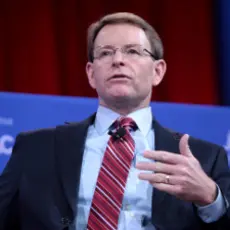Calvin Beisner of the Cornwall Alliance appeared on Janet Parshall’s radio show In The Market on Tuesday to discuss the “Green Dragon” film series which was made by Beisner’s group and hosted by Parshall. As we discussed in our report The ‘Green Dragon’ Slayers: How the Religious Right and the Corporate Right are Joining Forces to Fight Environmental Protection, the “Green Dragon” series represents efforts by the Religious Right and the Corporate Right to paint environmentalism as anti-Christian and ungodly:
During the radio show, Parshall played clips from the “documentary,” including one from Family Research Council president Tony Perkins, who argues that in the name of “population control” the government will eventually push “infanticide” and promote “same-sex relations”:
Perkins: Population control is a very loaded term. It includes not only abortion, contraception and sterilization, all at government expense of course, but it also includes infanticide and the promotion of same-sex relations. At the heart of this push for population control is an unbiblical view of children and of life.
Another clip featured right-wing pseudo-historian David Barton. Barton, who has made a career of infusing Religious Right beliefs into politics and American history, accused environmentalism of being “a religion” with its own rules and “high priests,” and went on to tell people to contest environmental beliefs because “that’s not science, that is the faith position that you’re taking”:
Barton: People say that environmentalism is a religion. Others say, ‘Oh no, that’s not true,’ but it really is. Now how do we know? I’ve been involved in seven cases at the US Supreme Court and I can point to a number of court decisions where the court has said religion is whatever you believe so strongly that it affects the way you live your life. That’s why the court recognizes even atheism as a religion. Environmentalism definitely is a religion, it has its own high priests, it has folks that tell us what we can and can’t do with the environment and how we can treat it and they’re the guardians of it as if it’s a great temple. It’s a religion. And as soon as we recognize that environmentalism is a religion then it helps us to understand better how to respond to what’s being said, how to filter what’s being said, and say, now wait a minute, that’s not science, that is the faith position that you’re taking.






